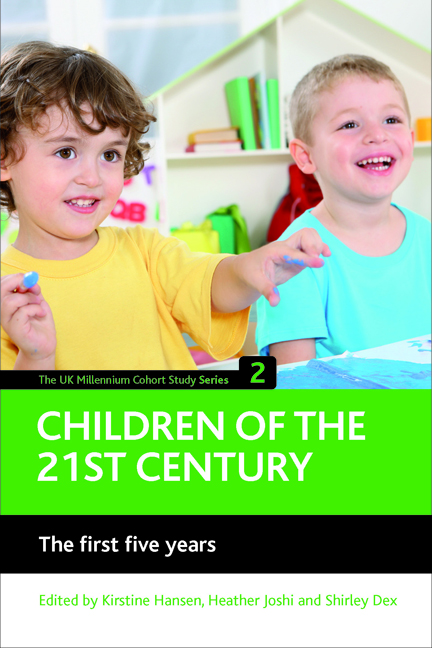Book contents
- Frontmatter
- Contents
- Acknowledgements
- List of contributors
- Glossary
- one Introduction
- two Child poverty in the first five years of life
- three Ethnicity, community and social capital
- four Parental relationships and parenting
- five Partnership trajectories, parent and child well-being
- six Employment trajectories and ethnic diversity
- seven Neighbourhoods and residential mobility
- eight Childcare in the pre-school years
- nine Intergenerational inequality in Early Years assessments
- ten Ethnic inequalities in child outcomes
- eleven School choice
- twelve Teacher assessments in the first year of school
- thirteen Childhood overweight and obesity
- fourteen Resilience in children's development
- fifteen Parental and child health
- sixteen Conclusions
- References
eleven - School choice
Published online by Cambridge University Press: 01 September 2022
- Frontmatter
- Contents
- Acknowledgements
- List of contributors
- Glossary
- one Introduction
- two Child poverty in the first five years of life
- three Ethnicity, community and social capital
- four Parental relationships and parenting
- five Partnership trajectories, parent and child well-being
- six Employment trajectories and ethnic diversity
- seven Neighbourhoods and residential mobility
- eight Childcare in the pre-school years
- nine Intergenerational inequality in Early Years assessments
- ten Ethnic inequalities in child outcomes
- eleven School choice
- twelve Teacher assessments in the first year of school
- thirteen Childhood overweight and obesity
- fourteen Resilience in children's development
- fifteen Parental and child health
- sixteen Conclusions
- References
Summary
Introduction
In 1988, the Education Reform Act for England and Wales strengthened parents’ rights to choose the school their child attended at primary and secondary school levels. Similar legislation was applied in Northern Ireland. The 1988 Act was introduced to encourage competition between schools, as they sought to attract pupils, with the idea that this would lead to higher standards of teaching and children's achievement. Despite obvious policy interest in the extent and consequences of school choice, there is remarkably little evidence on the process of school choice itself (at least from the parental perspective) and indeed there is only limited research into the factors that are uppermost in parents’ minds when choosing their children's primary school. The introduction of a policy on school choice has also left the lingering concern that school choice will lead to social segregation or ‘sorting’ across different schools. Others argue that school choice is actually not a reality for most parents, particularly in rural areas, who have no choice but to send their child to their local school. School choice in the state sector may largely be, therefore, an issue for parents living in specific urban areas, such as London, where there may be a number of local schools potentially available to them and the schools may vary substantially in quality. This chapter provides new information from the Millennium Cohort Study (MCS) to examine the extent to which parents do actually choose the schools their children attend, as opposed to simply enrolling them in their local school. We also explore how successful parents are in securing their first choice of school and the reasons for their choice.
Existing evidence on the extent of school choice by parents contains mixed results that are difficult to interpret. Some quantitative evidence is available, based on examining the extent to which children attend their nearest school. The assumption here is that if a child does not attend his or her nearest school, this implies that either the parent has exercised their right to choose their child's school, or perhaps that the child was unable to get a place at his or her nearest school. Allen and Vignoles (2007) have suggested that only around 1 in 5 children in England and Wales are benefiting from parental school choice.
- Type
- Chapter
- Information
- Children of the 21st century (Volume 2)The First Five Years, pp. 185 - 200Publisher: Bristol University PressPrint publication year: 2010



